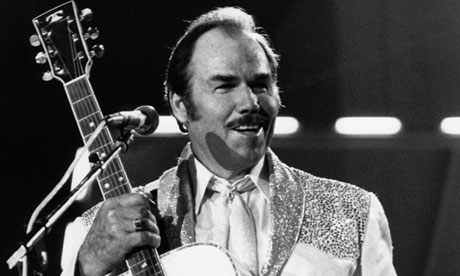Yodelling country singer best known for Rose Marie and Indian Love Call

Slim Whitman stayed at No 1 in the UK pop charts with Rose Marie for 11 weeks in 1955, a run that would not be bettered for 36 years.
The singer Slim Whitman, who has died aged 90, was a noteworthy figure in country music, since, although he was hugely popular outside the US, for most of his career he was almost forgotten in his own country. In the 1970s, two decades after his American heyday, he still commanded enough of a following in the UK to be voted the No 1 international star in a music poll – four times.
Much of the reason for his success outside the US was his high, clear, strong singing and almost operatic yodelling, characteristics that several generations in Britain, Australia and South Africa have assimilated into their notions and fantasies of the old west of America. One of Whitman's chief models was Wilf Carter, a Nova Scotian yodeller and singer of cowboy songs who was popular throughout north America in the 30s and 40s under the sobriquet Montana Slim.
What set Whitman apart from both his models and contemporaries was his bold choice of material. In the age of honkytonk music and Hank Williams, his two biggest hits, Indian Love Call (1952) and Rose Marie(1954), were drawn from operetta. Bob Sullivan, a radio engineer who worked with him, described him as being like "an Irish tenor singing Sigmund Romberg. Hank Williams couldn't stand him. He used to say, 'He ain't no hillbilly'."
Slim was born Otis Dewey Whitman in Tampa, Florida, and as a teenager was a promising baseball player, who returned to the game after service in the second world war. But while in the US navy, he had learned to play the guitar and then found an opening on local radio. By 1949 he was working with the long-established Texas band The Light Crust Doughboys, and in 1950 he joined the roster of the Louisiana Hayride, a widely heard barndance programme broadcast from the radio station KWKH in Shreveport, Louisiana.
On the recommendation of Colonel Tom Parker, who later managed Elvis Presley, but was then working for the country crooner Eddy Arnold, Whitman signed a recording contract with RCA Victor. He had some success in 1951 with Love Song of the Waterfall, a revival of a western ditty by the Sons of the Pioneers; a generation later, it would be briefly heard in Steven Spielberg's 1977 film Close Encounters of the Third Kind. Then, in 1952, Whitman moved to the west coast independent label Imperial and immediately had a hit with Indian Love Call.
The song, from the 1924 operetta Rose-Marie by Rudolf Friml, Oscar Hammerstein II and Otto Harbach, Indian Love Call had previously been recorded by Nelson Eddy and Jeanette MacDonald. Whitman's version not only reached No 2 in the country charts, but also appeared in the pop top 10, a feat repeated in the UK a few years later in 1955, when it spent 12 weeks in the charts. The director Tim Burton paid it a sort of tribute in his film Mars Attacks! (1996), in which Slim's recording is used as a weapon against alien invaders. "Yes," said Whitman with satisfaction in a 2008 interview, "I'm the one who killed the blasted Martians."
Rose Marie, the title song from the musical, followed in 1954 and fared even better overseas. It held the No 1 position on the UK pop chart for 11 weeks (a run that would not be bettered until Bryan Adams's Everything I Do (I Do It For You) 36 years later) and earned Whitman a spot in the nation's most glittering variety showcase, at the London Palladium. It became Australia's bestselling single to that date. Another UK top 10 hit came in 1957 for I'll Take You Home Again Kathleen.
His fame in America, however, soon evaporated. Though it was on a 1954 Hayride show headlined by Slim that Elvis Presley made one of his earliest live appearances in Memphis, the arrival of rock'n'roll served Whitman ill, as it did many of his fellow country artists. He continued to have records in the country charts, but they were low-placed, and after the mid-70s he made few more. Throughout the 60s and 70s he concentrated on performing for his overseas audiences, returning to semi-retirement in Middleburg, Florida.
Then, in 1979, he found a new niche in the US music business as a pioneer of the TV-merchandised bestseller, when his greatest hits album All My Best racked up a million and a half direct sales. It was followed by The Best (1982), Best Loved Favorites (1989) and 20 Precious Memories (1991). A new studio album, Twilight on the Trail, came out in 2010.
Jerry, his wife of 67 years, died in 2009. He is survived by his daughter, Sharon, and son, Byron, a musician who had worked with him.
• Slim Whitman (Otis Dewey Whitman), country music singer, born 20 January 1923; died 19 June 2013
No comments:
Post a Comment